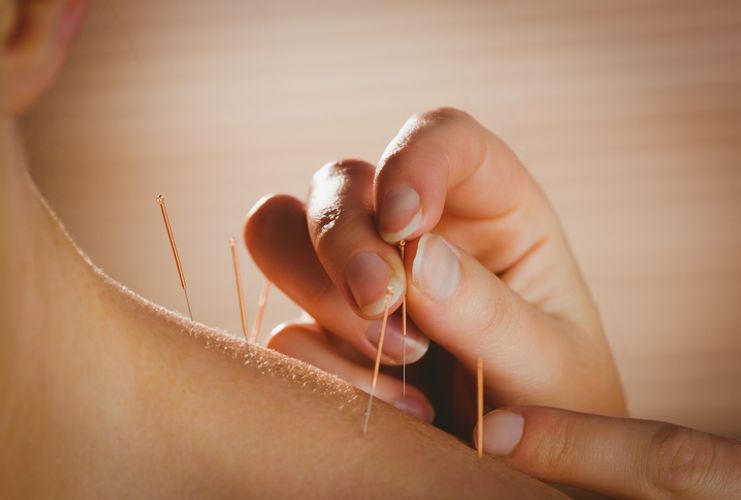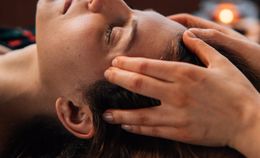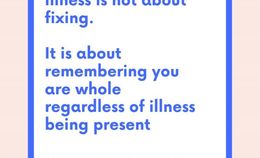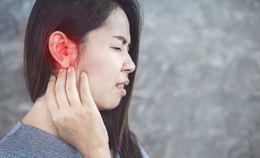If you suffer from chronic neck pain, you are not alone.
Today's plugged-in digital lifestyles are causing more and more people to suffer from severe and chronic neck pain. In fact, in 2014, the Washington Post reported on the phenomenon under the alarming headline, Text neck is becoming an epidemic and could wreck your spine.1
Health care professionals have been struggling to address this growing problem as increasing numbers of neck pain sufferers seek professional help with treatment and prevention.
Although "text neck" is increasing in prevalence and gaining a lot of media attention as a result, there are a variety of sources that can cause chronic neck pain. And effective treatments are available to help - namely, acupuncture.
This guide will discuss:
- The most common causes of neck pain
- Treatment options and prevention strategies
- How acupuncture helps neck pain
- Scientific support for acupuncture's efficacy in treating neck pain
Pain in the neck: Text Neck & other common causes
Neck pain can be caused by a range of conditions. These include:23
Whiplash. This injury, common in auto accidents, can damage the soft tissues of the neck, causing pain.
Poor posture. Leaning or hunching over too much for prolonged periods can cause muscle strain in your neck. Hunched positions among people working at computers (especially laptops) are common. Any lengthy time working at a desk or workbench can also be problematic.
Peering into a smart phone screen as you hold it in your hand can cause you to bend your neck downward, hugely increasing the weight on your cervical spine. The many hours each day people spend staring at their phones is the root of the "text neck" epidemic that's been the subject of much media coverage and many clinical studies in recent years.
The Washington Post coverage cited above noted the incredible increase in load just a small bend forward can place on the cervical spine. The human head weighs about twelve pounds, the article explains. But as a person bends their neck forward the effective weight on the upper spine increases dramatically:
At a 15-degree angle, this weight is about 27 pounds, at 30 degrees it's 40 pounds, at 45 degrees it's 49 pounds, and at 60 degrees it's 60 pounds.4
This frequent added load on the cervical spine causes rapid wear and tear, and one Australian study showed it may be causing bone spur growth at the base of the skull among adolescents, in a phenomenon similar to the development of calluses on skin.5
Osteoarthritis. This condition occurs when the cartilage between your vertebrae deteriorate, decreasing the cushioning between bones as you move. Osteoarthritis can cause inflammation and bone spur growth, which can interfere with motion and cause pain. Lack of movement in a joint often exacerbates arthritis pain.
Nerve pressure or irritation. Pain that is sharp, radiating down an arm, or accompanied by tingling may be a sign of direct pressure on a nerve. A "slipped" spinal disc (also called herniated disc) in your cervical spine is a common cause of a pinched nerve.
Muscle spasm. This is a sudden tight contraction of muscles that can cause stiffness and pain. There are a variety of causes but often it is hard to identify an immediate one.
Psychological stress. People under stress often tighten their muscles without realizing it, often in the neck and shoulders. This can lead to neck pain.
Headaches. Headaches are commonly accompanied by neck stiffness and pain.
Referred pain. Pain is considered "referred" when a problem in one part of the body causes pain in a remote location. For example, an injury or muscle spasm in the back may throw the musculoskeletal system out of alignment in other areas.
Treatment & prevention
Learning and practicing good posture when standing, working at a desk or looking at a smartphone screen can help alleviate excess pressure on the neck. Holding a phone screen up in front of you rather than low near your lap is best to avoid severe, extended curvature in the upper spine.
Similarly, if you use a laptop, attach an external monitor so that you can look straight ahead rather than down to view the screen. Adjust desktop computer workstations to allow this good posture as well.6
Taking regular breaks from computer work and spending less voluntary time at computers, desks or looking at phone screens is a good idea. Regularly moving, exercising and stretching your neck and shoulders can be helpful,7 especially if you suffer from arthritis.
Over-the-counter anti-inflammatory and pain relief medications may help for short-term and moderate neck pain.
If your neck pain is severe or chronic, your doctor might recommend physical therapy, traction (a treatment using special equipment that helps stretch your neck), injections of steroids, painkillers, or surgery. Short-term immobilization with a brace is sometimes also used.
Between lifestyle adjustments, therapeutic exercise, and over-the-counter pain medication on the one hand and highly risky and invasive treatments like injections and surgery on the other, the truth is that conventional medical approaches to neck pain are rather sparse and many people are left with incomplete treatment of their problem.
This is where acupuncture treatment can be a powerful complementary therapy.
How acupuncture heals neck pain
Acupuncture fills this gap in conventional treatment options through its power to stimulate the body's intrinsic healing abilities.
Rooted in Traditional Chinese Medicine and its emphasis on energy flows, or qi, acupuncture is gaining increasing recognition from western medical researchers and is now often recommended in conventional clinical settings as a first-line treatment option before riskier procedures like surgery or injections.
Traditional Chinese Medicine explains the power of acupuncture to heal by the way strategically-located acupuncture needles can stimulate the flow of qi around the body, freeing blockages and impairments along the meridians, or energy pathways. This leads to greater resiliency and self-healing capacity.
Science supports acupuncture's efficacy for neck pain
The scientific approach often uses different language to discuss acupuncture's efficacy but clinical studies strongly support its use for a range of health conditions, including neck pain, and to improve overall health and well-being.
A major 2006 study conducted in Germany with more than 14,000 patients showed that acupuncture significantly reduced the pain and disability of chronic neck pain sufferers.8
A 2015 study involving more than 500 British chronic neck pain patients and published in the Annals of Internal Medicine similarly concluded that a series of regular acupuncture treatments were effective in reducing pain and disability.9
A 2017 study in the peer-reviewed neurology journal Brain10 demonstrated acupuncture's effectiveness in reducing pain and restoring function in carpal tunnel syndrome sufferers, and documented physiological changes following acupuncture treatment that help explain its effects in a variety of applications. Brain imaging conducted by the researchers suggested that acupuncture treatment reduces pain symptoms by rewiring the brain.11
Other research has shown that acupuncture impacts body temperature, blood flow12 and blood pressure, stimulates immune system function,13 reduces inflammation14 and releases the body's own pain-killing substances, including endorphins.15 Research is ongoing, but it is clear that acupuncture effectively stimulates the body's own healing process through a variety of mechanisms.
The Bottom Line
The ancient healing art of acupuncture, long recognized by practitioners and patients as an effective treatment for neck pain and many other chronic pain conditions, is now enjoying mounting respect from conventional medical science as well.
Acupuncture's low-risk, low-cost qualities make it especially appealing as a treatment option before patients commit to higher-risk options with worrying side effects for pain management, such as steroid or pain relief injections, opioid medications, or surgery.
A course of acupuncture treatment for neck pain can benefit the patient by reducing pain and disability. And by achieving overall energetic rebalancing, the patient is likely to enjoy greater holistic health and wellness. Neck pain sufferers and many others can benefit from the strengthened capacity for self-healing that acupuncture offers.
References:
1 "'Text neck' is becoming an 'epidemic' and could wreck your spine": https://www.washingtonpost.com/news/morning-mix/wp/2014/11/20/text-neck-is-becoming-an-epidemic-and-could-wreck-your-spine/
2 "The 7 Faces of Neck Pain": https://www.health.harvard.edu/pain/7-faces-of-neck-pain
3 "Neck Pain": https://www.mayoclinic.org/diseases-conditions/neck-pain/symptoms-causes/syc-20375581
4 "'Text neck' is becoming an 'epidemic' and could wreck your spine": https://www.washingtonpost.com/news/morning-mix/wp/2014/11/20/text-neck-is-becoming-an-epidemic-and-could-wreck-your-spine/
5 "'Horns' are growing on young people's skulls. Phone use is to blame, research suggests": https://www.washingtonpost.com/nation/2019/06/20/horns-are-growing-young-peoples-skulls-phone-use-is-blame-research-suggests/
6 "Neck Pain - Symptoms and Causes": https://www.mayoclinic.org/diseases-conditions/neck-pain/symptoms-causes/syc-20375581
7 "How to Soothe a Sore Neck": https://www.health.harvard.edu/pain/how-to-soothe-a-sore-neck
8 "Acupuncture for patients with chronic neck pain": https://www.ncbi.nlm.nih.gov/pubmed/16781068
9 "Alexander Technique Lessons or Acupuncture Sessions for Persons With Chronic Neck Pain: A Randomized Trial": https://www.acpjournals.org/doi/10.7326/M15-0667?doi=10.7326%2FM15-0667
10 "Rewiring the primary somatosensory cortex in carpal tunnel syndrome with acupuncture": https://academic.oup.com/brain/article/140/4/914/3058778
11 "Can Acupuncture Cure Carpal Tunnel Pain?": https://www.healthline.com/health-news/acupuncture-for-carpal-tunnel-syndrome#1
12 "Acupuncture Improves Circulation": https://www.healthcmi.com/Acupuncture-Continuing-Education-News/1441-acupuncture-improves-circulation
13 "Effect of acupuncture treatment on the immune function impairment found in anxious women": https://www.ncbi.nlm.nih.gov/pubmed/17265549
14 "Acupuncture": https://my.clevelandclinic.org/departments/wellness/integrative/treatments-services/acupuncture
15 "Acupuncture": https://my.clevelandclinic.org/departments/wellness/integrative/treatments-services/acupuncture















